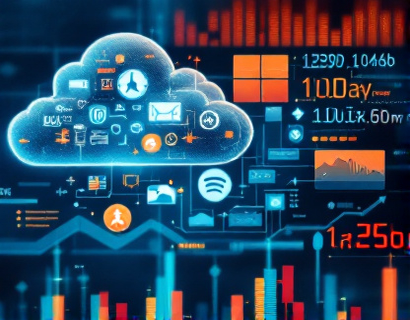Data-Driven Social Marketing: Empowering Businesses to Optimize Online Engagement and Boost Brand Presence
In the digital age, social media has become an indispensable tool for businesses aiming to enhance their online presence and engage with their audience effectively. The landscape of social marketing is rapidly evolving, driven by advancements in technology and the increasing availability of data. This comprehensive guide delves into the realm of data-driven social marketing, offering advanced strategies to help businesses optimize their online engagement and boost their brand presence. By leveraging sophisticated tools and insights, companies can streamline their social media management, refine their content distribution, and gain actionable insights into their performance metrics.
The foundation of any successful social marketing strategy lies in understanding the target audience. Data-driven approaches enable businesses to gain deep insights into audience behavior, preferences, and demographics. By analyzing these data points, companies can tailor their content to resonate more effectively with their audience. For instance, understanding the best times to post, the types of content that perform best, and the platforms where the audience is most active can significantly enhance engagement rates. This level of customization not only improves user experience but also increases the likelihood of converting followers into loyal customers.
Advanced Audience Insights
One of the key advantages of data-driven social marketing is the ability to gather and analyze comprehensive audience insights. Modern social media platforms provide robust analytics tools that offer detailed reports on user interactions, such as likes, shares, comments, and click-through rates. These metrics, when analyzed correctly, can reveal patterns and trends that inform content creation and distribution strategies. For example, if data shows that a particular type of content, such as video posts, receives higher engagement on Instagram, a business can allocate more resources to producing high-quality videos for this platform.
Moreover, demographic data can help businesses segment their audience and create targeted campaigns. By identifying the age, gender, location, and interests of their followers, companies can craft messages that speak directly to specific groups. This segmentation not only enhances the relevance of the content but also improves the overall effectiveness of the marketing efforts. For instance, a fashion brand might create different content for young adults and middle-aged professionals, tailoring the messaging and visuals to align with each group's preferences.
Optimizing Content Distribution
Content is king in the world of social marketing, but the timing and platform selection are crucial for maximizing its impact. Data-driven strategies enable businesses to optimize content distribution by identifying the most effective times to post and the platforms where their audience is most active. For example, a business might discover through analytics that its audience is most active on Facebook during lunch hours and on Instagram in the evening. By scheduling posts accordingly, companies can ensure their content reaches the maximum number of eyes at the optimal times.
Additionally, data can help determine the best content formats for different platforms. Visual content, such as images and videos, tends to perform well on platforms like Instagram and TikTok, while more text-heavy content might be more suitable for LinkedIn. By analyzing performance data, businesses can refine their content strategy to align with the strengths of each platform, thereby increasing engagement and reach.
Enhancing Engagement Through Personalization
Personalization is a powerful tool in social marketing, and data-driven approaches make it easier than ever to create personalized experiences for users. By leveraging data on user interactions and preferences, businesses can deliver tailored content that resonates on a personal level. For instance, using customer data to create personalized recommendations or offers can significantly boost engagement and customer loyalty. A retail brand, for example, might use data to send personalized product suggestions based on a user's past purchases and browsing history, making the shopping experience more relevant and appealing.
Moreover, interactive content such as polls, quizzes, and live streams can be highly effective in engaging audiences. Data analytics can help businesses determine the types of interactive content that perform best and the optimal times to host these events. By fostering a sense of community and encouraging user participation, companies can build stronger relationships with their audience and enhance brand loyalty.
Performance Metrics and Analytics
To truly harness the power of data-driven social marketing, businesses must focus on tracking and analyzing key performance metrics. These metrics provide valuable insights into the effectiveness of marketing efforts and help identify areas for improvement. Some of the most important metrics to monitor include engagement rates, reach, click-through rates, conversion rates, and follower growth. By regularly reviewing these metrics, businesses can make data-informed decisions to optimize their strategies.
For instance, if engagement rates are low for a particular campaign, it may indicate that the content is not resonating with the audience. In this case, the business can adjust the content strategy, perhaps by experimenting with different formats or messaging. Similarly, tracking follower growth can help determine the success of acquisition efforts and inform future marketing investments. Advanced analytics tools can automate the collection and analysis of these metrics, saving time and providing real-time insights.
Strategic Use of Social Listening
Social listening is another critical component of data-driven social marketing. By monitoring conversations and mentions related to the brand, industry, and competitors, businesses can gain valuable insights into customer sentiment and market trends. This proactive approach allows companies to respond promptly to customer feedback, address issues, and capitalize on emerging opportunities. For example, if a brand notices a surge in positive mentions during a specific event, it can leverage this momentum by creating related content or running a promotional campaign.
Social listening tools can also help identify influencers and key opinion leaders within the target audience. Collaborating with these influencers can amplify the brand's reach and credibility. By analyzing the data from social listening efforts, businesses can refine their influencer marketing strategies and ensure that partnerships align with their overall marketing goals.
Leveraging Automation and AI
The integration of automation and artificial intelligence (AI) into social marketing strategies can significantly enhance efficiency and effectiveness. Automation tools can streamline routine tasks such as scheduling posts, monitoring analytics, and managing customer interactions, freeing up time for more strategic activities. AI-powered chatbots, for instance, can provide instant customer support, answer frequently asked questions, and even engage users in conversations, improving the overall customer experience.
Moreover, AI algorithms can analyze vast amounts of data to identify patterns and predict future trends. This predictive analytics capability allows businesses to stay ahead of the curve, making proactive decisions based on data-driven insights. For example, AI can forecast the best times to post based on historical engagement data, or suggest content themes that are likely to resonate with the audience.
Building a Data-Driven Culture
To fully realize the benefits of data-driven social marketing, businesses must cultivate a culture that values data and analytics. This involves training staff to interpret and act on data insights, as well as integrating data-driven decision-making into the organizational workflow. By fostering a data-centric mindset, companies can ensure that all marketing efforts are aligned with measurable goals and objectives.
Regular training sessions and workshops can help team members understand the importance of data and how to use analytics tools effectively. Encouraging a culture of experimentation and continuous improvement can also drive innovation and enhance the overall marketing strategy. By embracing a data-driven approach, businesses can stay agile and responsive to changing market conditions and audience preferences.
Conclusion
In conclusion, data-driven social marketing offers a powerful framework for businesses to optimize their online engagement and boost their brand presence. By leveraging advanced analytics, personalized content, strategic content distribution, and automation, companies can create a comprehensive and effective social media strategy. The key to success lies in understanding the target audience, monitoring performance metrics, and making data-informed decisions. As the digital landscape continues to evolve, embracing data-driven approaches will be essential for businesses aiming to thrive in the competitive world of social media.











































